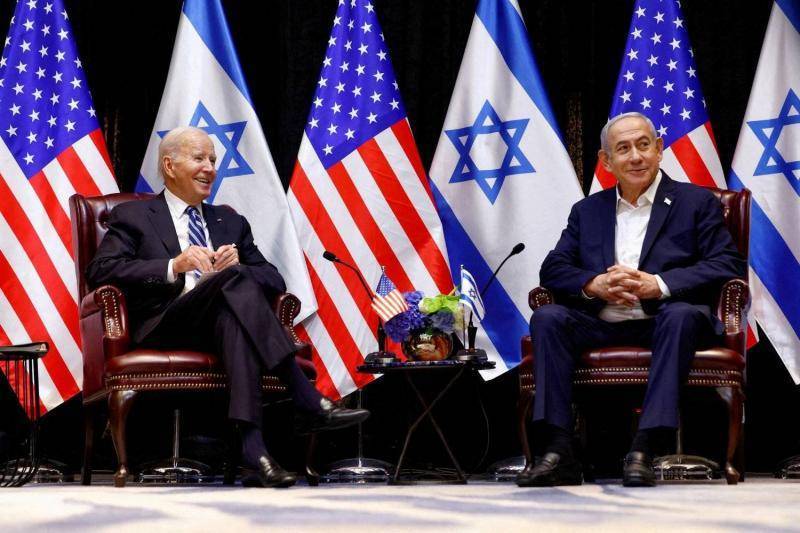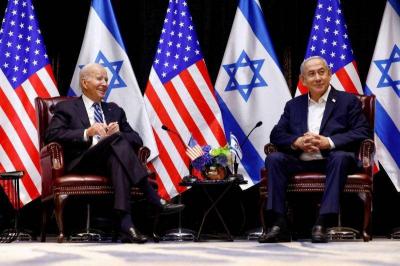U.S. President Joe Biden's speech regarding a proposal to end the war in Gaza has stirred stagnant discussions around the ceasefire negotiations, which have been stalled for months, especially given the Israeli government's and Hamas's willingness to respond, as well as the mediators' readiness to move forward in preparation for obtaining both parties' approval to implement its terms. However, the proposal itself has served as a "serious test" of how Israeli Prime Minister Benjamin Netanyahu will handle the internal and external crises surrounding him.
Israeli analysts and observers told "Sky News Arabia" that Biden has placed Netanyahu in what is described as the "biggest dilemma" of his political life, as he faces two options: either favoring the hardline coalition by continuing military operations and causing the negotiations to falter to maintain power, or accepting the current proposal to alleviate internal and external pressures.
**What Happened?**
Biden presented a three-phase proposal for a ceasefire in Gaza, primarily aimed at halting fire between Israel and Hamas, freeing Israeli hostages and Palestinian prisoners, and reconstructing Gaza. The international community welcomed the proposal, with United Nations Secretary-General Antonio Guterres encouraging "all parties to seize the opportunity for a ceasefire," while French President Emmanuel Macron called for "lasting peace" in the region.
Netanyahu asserted that the terms for ending the war in Gaza "have not changed," stating in a release from his office that "under the proposal, Israel will insist on meeting these conditions before establishing a permanent ceasefire; the idea of Israel agreeing to a permanent ceasefire before these conditions are fulfilled is out of the question."
Domestic pressure is mounting on Netanyahu to accept the proposal, with the families of hostages urging all parties to immediately agree to it, addressing the Israeli Prime Minister by saying: "Time is running out, and this might be the last opportunity to save the lives of our loved ones." Opposition leaders have called for acceptance of the proposal, with opposition leader Yair Lapid offering Netanyahu support if his far-right government partners resist. He added: "There is an agreement on the table that needs to be signed," and war council minister Benny Gantz called for a session with the negotiating team to decide on the next steps.
The newspaper "Haaretz" quoted an American official saying that Netanyahu might place obstacles in the way of the deal proposed by Biden, but his initial reaction was encouraging. It noted that Washington is concerned about the reaction of Finance Minister Bezalel Smotrich and National Security Minister Itamar Ben Gvir regarding the deal and the potential influence they may exert on Netanyahu.
Israeli political analyst Shlomo Ganor, speaking to "Sky News Arabia," stated that Biden's proposal is based 99% on the Israeli plan unanimously approved by the war council, which was presented to mediators as the basis for negotiations with Hamas. Ganor mentioned that Biden has placed Netanyahu in the "greatest dilemma," either favoring the coalition and continuing the war or accepting the proposal, adding: "We must wait for Netanyahu's decision and his justification for it," also noting that the proposal was not presented to the Cabinet for fear of opposition from far-right parties.
Ganor considered that the Israeli internal situation is approaching historic decision points, one of which is the fate of the captives stemming from the continuation of the war, and the severity of the Israeli public's response to other challenges such as the economic situation, recruiting issues, and overcoming international pressures, emphasizing that "navigating through most of these crises and formulating a policy to overcome them could be an achievement and a promising hope."
The Israeli political analyst noted that if Netanyahu fails to convince the Israeli public, it could lead to growing discontent and public demonstrations, calling for early elections.
For his part, Israeli political analyst Yoav Stern, speaking to "Sky News Arabia," believes that Netanyahu's speech and the announcement of the proposal "was not an opportunity to save Netanyahu but to impose further constraints on him, cornering him to affirm his commitment to a proposal that should have come from him in the first place." Stern clarified that "Biden has highlighted Netanyahu’s reality, so there is no gap between his publicly declared position to the people and his partners in government and what is tabled to ensure this deal arrives," stressing that the U.S. President is not interested in rescuing Netanyahu from the internal and external pressures surrounding him.
Regarding Netanyahu's handling of the ceasefire deal, Stern indicated that "Netanyahu will present this proposal as a personal victory for him in securing the release of 33 hostages among the living and the dead," adding: "However, this does not mean that the story ends there, as there will be obstacles in his path to continue the ceasefire, and Israel may return to war if future negotiations fail."




